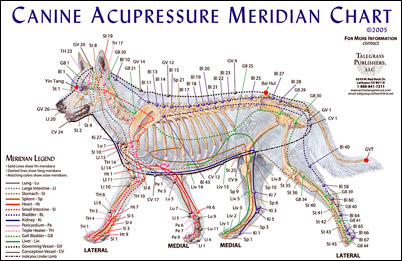A decade ago, you may not have heard of acupuncture let alone thought about using it on your pet. Nowadays, the benefits of good veterinary acupuncturists are becoming more widely known and accepted as part of a well-rounded approach to animal health.
Acupuncture is an ancient Chinese practice that uses needles to stimulate the interconnected system of nerves in the body and restore energy balances. These nerves and energy meridians run throughout the body and connect different organs, which is why an acupuncturist may put a needle in your earlobe in order to address, for example, a gastrointestinal issue. Acupuncture is even used for psychological healing in humans and has been shown to be particularly effective at helping overcome addiction.
Animal acupuncture provides the same benefits to our furry friends that it does for us humans and is used for many of the same problems, such as pain relief and digestive problems. Dr. Jennifer Yamamoto is an experienced veterinary acupuncturist who also includes the Assisi Loop in her healing repertoire. Read our special interview with her to find out what it’s like to treat your pet at her clinic in Walnut Creek, California.
More and more veterinary clinics are hiring veterinarians like Dr. Yamamoto these days; at the same time, choosing a veterinary acupuncturist can be confusing, especially if you don’t know what kind of credentials and licenses to look for. Here is a handy guide from a recent article in the Washington Post:
In order to receive certification in veterinary acupuncture (CVA designation), a veterinarian must take courses approved by the International Veterinary Acupuncture Society and complete a certain number of observation hours with a certified veterinary acupuncturist. He or she must then write a case report suitable for publication and pass a test. Typically, a basic course is around 180 hours.
A CVA vet can then go on for advanced training — and a rigorous examination — to receive the title of Fellow of the American Academy of Veterinary Acupuncture. “If you see ‘FAAVA’ after someone’s name, they have done a great deal of additional study,’’ says Susan Wynn, president of the American Academy of Veterinary Acupuncture.
Several thousand U.S. veterinarians are certified to perform acupuncture and will have CVA, FAAVA after in their title. Of course, when looking at a veterinary acupuncturist, first and foremost make sure that he or she is in fact a licensed vet — that is, a person trained in conventional veterinary medicine (with a title of DVM or VMD and/or AVMA).
The following organizations can provide information about veterinary acupuncturists and help you locate one:
- American Academy of Veterinary Acupuncture, www.aava.org
- International Veterinary Acupuncture Society, www.ivas.org
- American Holistic Veterinary Medical Association, www.ahvma.org
- Chi Institute, www.tcvm.com
- Center for Comparative and Integrative Pain Medicine at Colorado State University College of Veterinary Medicine & Biomedical Sciences, www.csuvets.colostate.edu/pain/CCIPM.htm
- American Medical Veterinary Association, www.avma.org

